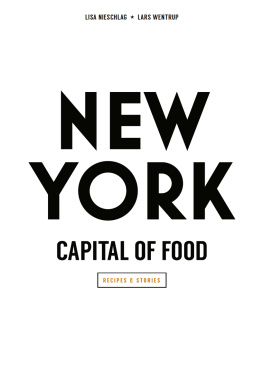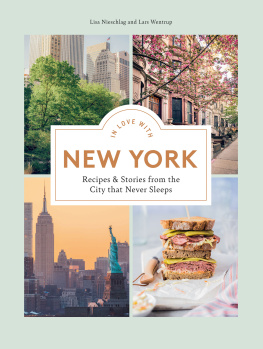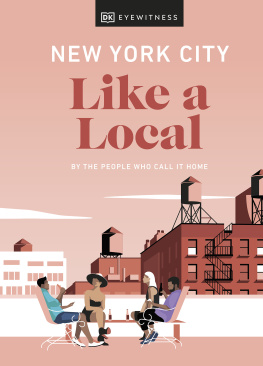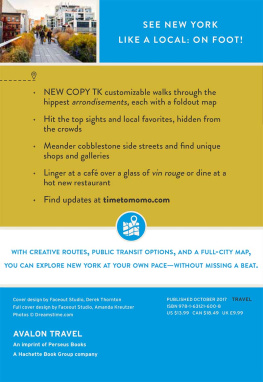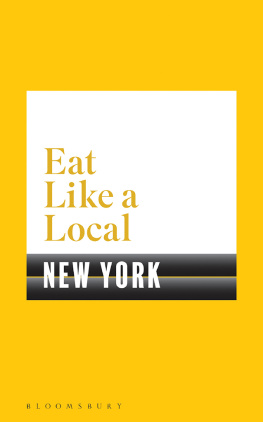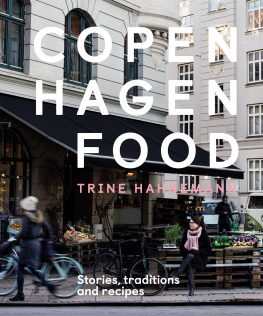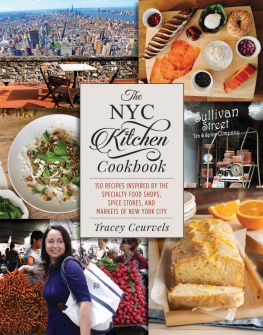P art recipe book, part foodie travel experience, New York: Capital of Food brings the flavours of the Big Apple into your kitchen, immersing you in hustle and bustle and the taste experience that is New York. Start the day with something sweet, like a dreamy caramel roll, the type you get in a cosy coffee shop in Greenwich Village. Then cook a comforting corn chowder, like youd find in trendy Williamsburg, tickle your tastebuds with authentic Chinatown Chinese chicken wings or sip a cool Long Island Iced Tea and dream of New Yorks skyline and its stylish rooftop bars.
THIS IS HOW NEW YORK TASTES!
CONTENTS
NEW YORK CAPITAL OF FOOD
Cafs & Coffee Shops
Central Park Picnic
Capital of Food
Melting Pot
Rooftop Bars
stories
New York Always a Good Idea
New York, one of the worlds great cities, is a melting pot of cultures. Few other cities are as international and diverse as the Big Apple.
If you can make it here, you can make it everywhere! The citys many different cultures and nationalities are a mirror of the various waves of immigration throughout American history. And New Yorks culinary influences, ranging from hot Asian stir-fried noodles to spicy Mexican burritos and Jewish shakshuka, are just as multicultural and fascinating as its people.
New York Capital of Food is the third cookbook that we dedicate to this melting pot on the Hudson River, this true treasure trove of delicious recipes, fabulous images and beautiful stories. We love this city and its diversity, which makes it a place like no other.
Do you know the Duke Ellington song Take the A Train ? This jazz classic is a hymn to New Yorks oldest subway, line A, and we have taken it as our inspiration for exploring the citys multi-faceted culinary delights. Join us on our tour of discovery this is the taste of New York!
Start your day with something sweet from one of the almost endless number of coffee shops. Take some time out for a picnic in the verdant oasis that is Central Park. Relax over a sumptuous dinner in one of the citys best restaurants, anywhere between the Upper West Side and Greenwich Village. And by all means stop to explore the lively neighbourhoods of Little Italy and Chinatown, setting yourself adrift in the hustle and bustle, exotic scents and special flair of these two unique pockets of New York. End your day with a birds eye view of this incomparable city, perhaps over a cool Long Island Iced Tea in one of New Yorks trendy rooftop bars.
Join us on our trip to New York, the worlds capital of food and culinary delights. The route is up to you.
Enjoy!
Lisa Nieschlag and Lars Wentrup


The Great Glander
Stevan Paul
T he first thing Gustav acquired in New York was a daily routine. Giving his days structure made the foreign a little less foreign and provided something of a safety rope to which Gustav could cling while gingerly exploring his new life. It created a small piece of a self-determined world in the middle of this giant metropolis whose multitude of colours and deafening sounds was nothing if not sensory overload. Early in the mornings, while his room mates were still asleep, he would leave the student dorm where he had found an inexpensive room. The dorm was smelly; particularly in the mornings there seemed to be hardly any oxygen left in the corridors onto which the small rooms opened. The air smelt of second-hand clothes bins and leftover curry noodles from the Indian take-away on the corner. It smelt of stuffy socks, cold smoke and endless incense from the open kitchenette on the corridor. Outside the building, Gustav took a deep breath, zipped up his training jacket and started to run at a light pace. He enjoyed his early morning runs. He had worked out a route on foot and using a map and now ran the same round every morning. Running was the same as at home. It relaxed him as his steps on the asphalt turned into a monotonous rhythm that provided the perfect background for thinking. Within a few metres, he was already entirely in his own world, developing thoughts and ideas, while his body was busy running, and most of the time he came out of his runs a little wiser than when he started. He often thought of Katrin during his runs, of the life they had shared, of the small cinema that had first brought them even closer together and then driven them apart. He missed her. He had called her twice from the pay phone in the dorm. It had been very expensive, and there had been a lot of silences while he kept feeding coins into the phone until his palm was empty and the call was disconnected. Now he wrote to her regularly, asking how she was doing in her apprenticeship and whether life was good. He had not had any reply. In his letters, he also told her about New York and the art academy, but only sparsely and without exuberance. He never dropped a word about how difficult he found it to meet people; he had never been very good at talking, and having to speak English now almost sent him mute. Although he had done well in English at school, he was slow too slow to find the right words when talking to his room mates and other students, and so he often ended up thinking and smiling quietly while the people he was trying to talk to would give him a little wave, mutter ahokaydoesntmatterseeya and turn away, rolling their eyes. The lessons at the art academy also dragged on slowly, without him contributing much to discussions. Earlier, professors and teaching staff had still encouraged him to speak, but then, over time, they had come to address the tall, silent German less and less often, favouring more dynamic exchanges during their classes, especially as he achieved good marks in his written papers and his practical work also suggested a talent for drawing and painting.

There was Sting singing the song about an Englishman in New York on the radio, and Gustav sang along quietly, be yourself no matter what they say...
Sometimes his father would call the pay phone on the dorm corridor; he would sound excited, as if it was he who was in New York, delighted beyond words about his son, who was now living in a global metropolis. Each telephone conversation started by comparing the time of day here and there, and then father would want to know about everything, the sounds of the city, shops and businesses, the architecture and the cars in the streets, the food and the smells, the colours, the people: Come on, son, dont make me ask all the time, tell me more! In the background, there would be mother reminding them about the cost of long-distance calls to America. When father passed the telephone to her, she would usually start sobbing as soon as she heard Gustavs voice. The main thing is that youre happy! she would cry again and again. Was he happy? Another good question ideal for pondering while running through this new city, with the definite answer always just ahead of Gustav Glander, always just out of reach. There was the once-in-a-lifetime opportunity of this scholarship, certainly, but there were also doubts and homesickness that accompanied him wherever he went. At least his regular runs gave him a little bit of a grounding. Twice every day, Gustav would tie the laces of his white runners with the three blue stripes and start running. It gets me to think differently, he had told another student in the dorm by way of explanation, who in turn passed him a lit joint, uncomprehendingly. Try this; works just as well, dude! he had said. But Gustav loved his runs, especially the morning ones. For the first ten minutes he would run leisurely through Greenwich Village, where shutters were drawn up noisily as if the city was clearing its throat. Coffee was being brewed behind hesitantly opened windows; tea pots whistled energetically; and night owls were standing outside bakeries, biting hungrily into the first, oven-fresh croissants of the morning, chatting and laughing about their nights out, with smudged make-up and lightness on their faces.

